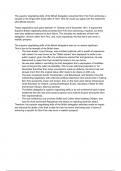Essay
GCE CCEA A2 History Anglo Irish Treaty (Top mark band essay)
- Module
- Partition of Ireland 1900–25
- Institution
- CCEA
All the uploaded essays are my own work. The contents and points are drawn from textbooks, the eguide published by CCEA, and additional materials from various sources, then condensed into one top-mark band essay. The essay might require a slight twist in its linking back to the question or conclu...
[Show more]



